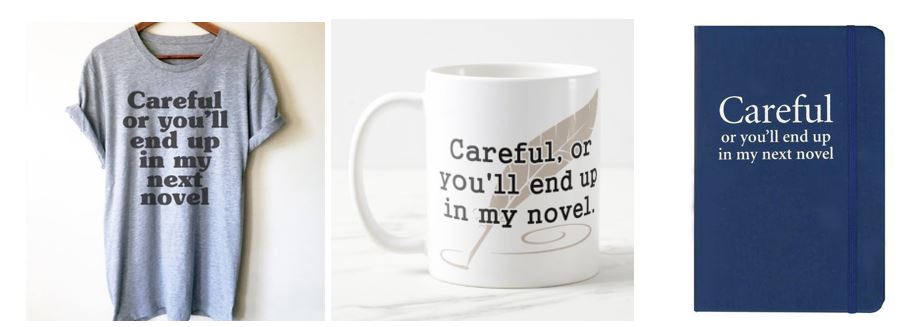You’ve probably seen this meme before. And apparently there is merchandise too!

I’ve always laughed at this, but it became somewhat of a more serious discussion in my life recently when two friends expressed their concerns that I would write about them (wait, does the fact that I’m writing this blog post mean I’m writing about them?!).
At first, I was baffled by this. How could they think I would write about them? Do they really think I would exploit my friendship with them for a story? But, after some thinking, I understand their fears.
The thing is, I draw on things from my real life in my fiction all the time. And, more recently, I’ve started publishing nonfiction essays (here, for example). Personally, I value being transparent and open because I have benefited greatly from others being transparent and open. In this podcast episode, one of the hosts told Glennon Doyle that her vulnerability and authenticity are gifts because they allow others to also be vulnerable and authentic. To me, this is the real value in being a writer–it’s articulating the complexities of being human so that others say, “Yes, that’s it!” and feel a little less alone in this crazy world.
In each of my novels, there are kernels of truths from my real life (some bigger than others). Nothing in my fiction is exactly as it is/was in my real life–I dramatize, exaggerate, embellish. In other words, I fictionalize. But, of course, those close to me can often spot the kernels, and I guess if they think they see themselves in those kernels, it makes them uncomfortable.
Most of the characters in my books are completely made up, not even loosely based on someone I know. There are a few who are inspired by real people, but they are usually a mix of different people–one person’s appearance, another person’s manner of speaking, another person’s sense of humor. If I feel compelled to add a real person’s trait to a character, it’s usually in a complimentary way, like paying homage to them.
Bits and pieces of my husband appear in my fiction, and he knows that. He’s never once expressed discontent with a character who resembled him in some way. He’s never once suggested I not write something. He knows me. He knows what writing means to me. He knows that if something I write hits a little close to home, it comes with the territory of loving me. I’m grateful for that, for his trust and for the freedom it gives me. I guess that’s why I was a bit hurt by my friends’ concerns–I thought they had the same trust in me.
I don’t know what The Writer’s responsibility is to the real people in her life. In Bird by Bird: Some Instructions on Writing and Life, Anne Lamott says this:

Also in Bird by Bird:
“Toni Morrison said, ‘The function of freedom is to free someone else,’ and if you are no longer wracked or in bondage to a person or a way of life, tell your story. Risk freeing someone else. Not everyone will be glad that you did. Members of your family and other critics may wish you had kept your secrets. Oh well, what are you going to do? Get it all down. Let it pour out of you onto the page.”
And regarding one of her books: “Some people may have thought that this book was too personal, too confessional. But what these people think about me is none of my business.”
And: “We write to expose the unexposed. If there is one door in the castle you have been told not to go through, you must. Otherwise, you’ll just be rearranging furniture in rooms you’ve already been in. Most human beings are dedicated to keeping that one door shut. But the writer’s job is to see what’s behind it, to see the bleak unspeakable stuff, and to turn the unspeakable into words–not just into any words but if we can, into rhythm and blues.”
Then there’s this quote from Stephen King:

The writer in me says, “Yes! Write your truths. Be honest. Don’t worry what anyone thinks.” But, part of me also feels that I need to be considerate of how those truths affect others. It’s a fine line. Every writer knows that if you think too much about your readers, you will be paralyzed. There is no pleasing everyone. Someone–a friend, relative, stranger–is going to be offended, somehow. I realized this quickly after publishing my first novel and reading a Goodreads review that stated, “This is the story about the most selfish person on the planet” (that was the extent of the review).
I have also had the situation of someone thinking they saw themselves in one of my books when I really and truly did not base the character on them. And there are times when readers assume something completely made up is true. So, I can’t win. I can’t help what people see, think, and feel. I can’t help what hits a nerve. In my first novel, the main character is estranged from her neglectful mother and my own mom (who I am very close to) said, “She’s not somehow based on me, right?” I just laughed. But, seriously, if my own mom has to wonder, I don’t want to know what other readers assume about my life.
In regards to the kernels of real life I do share: What I’ve come to see is that while I value writing that is real and raw, others may be threatened by real and raw. While I crave transparency and openness, others may fear it. I tell the stories I need to tell. The people in my life, the ones who really “get” me, understand those stories. At the end of the day, they are just that–stories.